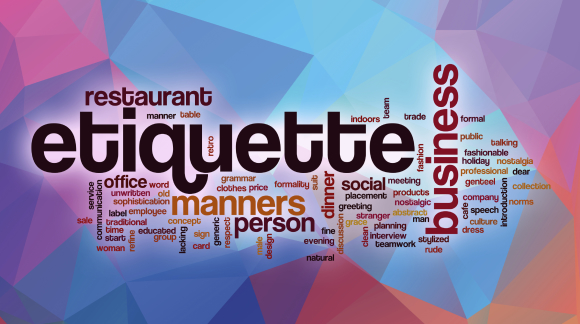Basic Manners that Apply Around the World

Social Graces that Go a Long Way
Manners vary from country to country based on religious customs and longstanding traditions. For example, in the United States, belching is considered rude and should immediately be followed up with a polite “excuse me.” However, throughout China, belching is considered a compliment to the chef. No one will shame you in China for belching, but they will admonish you for finishing your entire meal.
International Etiquette
The following is a list of basic etiquette skills that can help you cross cultural boundaries and remain professional and polite in most places of the world:
- Remove your shoes when entering someone’s home (especially throughout Asia).
- Dress your best. It is always better to be overdressed if you are unsure how to dress for the occasion.
- Avoid chewing gum in Illegal in some parts of the world and looked down on in others, chewing gum has no social benefit, so it is better to avoid it altogether. The same goes for whistling and winking.
- Always use utensils, not your fingers (even when eating pizza).
- Keep your feet on the ground. For example, do not lift your feet up onto seats in public transportation or parks for added comfort.
- Tip properly. Tipping for excellent service is acceptable in most parts of the world, but you should be careful to follow the regional customs.
- Watch facial expressions. Be aware of your facial muscles and smile upon an initial greeting.
- Allow the person you are communicating with to talk about himself first and show that you are listening through non-verbal cues.
- RSVP properly. Texting, or otherwise communicating via technology, is not an appropriate excuse for not showing up somewhere.
- Make eye contact during conversations, but avoid staring.
- Watch voice volume. Speak loudly enough so that the person you are speaking to doesn’t need to strain to hear you, but quietly enough to not disturb those who are standing near.
- Stand for the elderly, pregnant and young on public transportation. It is generally good manners to help these people with doors and with reaching high items in a store.
- Avoid pointing with your fingers. The better option is to gesture in the direction of the object or place you are drawing attention to.
Proper conduct is not always black and white. For example, whether or not to finish your meal varies from country to country. In China, finishing your meal implies that you did not have enough food, while in Italy cleaning your plate implies that the food was delicious.
Throughout the United State and the United Kingdom, a strong handshake shows dominance and power. In Indonesia, it is considered rude and violent to shake someone’s hand roughly.
When visiting other countries it is usually understood that the visiting person is not familiar with the customs. However, when traveling, you should always make an effort to learn about the expected behaviors of that culture. The free international etiquette guides for each country, provided by Kwintessential, is a great starting point.
Most people are able to tell if your intentions are good, even when breaking their normal customs. Abiding by the guidelines above can help you display good manners and engage in socially proper conduct around the world.
Additional Resources
- 10 by 10: Social graces Every Child Should Know by Age 10, by aNewsCafe.com
- Etiquette & Social Graces, by Jessica Martinez
- Diminishing Southern Manners and Social Graces, by Nancy Houser
- Amazing Grace: Tips for Teaching Child Manners, by Robin McClure
- Telephone Manners and Telephone Tips, by Regina Robo
- French Etiquette, by pariscultureguide.com
- Manners Matter Nigeria, by mannersmatternigeria.com
- Dining Etiquette from Around the World, by Emi Boscamp, the Huffington Post
Videos
- Teaching Social Grace and Good Manners, by Kimberley Blaine
- Dining Etiquette & Table Manners, by the Art of Manliness
- Table Manners 101, by marthastewart.com
Education
- Leadership Training Curriculum: Social Graces, by the Orlando Institute
- Dining for Success, by Social & Business Graces, Inc.
- Culture and Manners Institute, by cultureandmanners.com
Books
- Social Graces: Manners, Conversation, and Charm for Today, by Ann Platz and Susan Wales
- The Art of the Social Graces, by Bernadette Petrotta
- Teen Manners: From Malls to Meals to Messaging and Beyond, by Cindy Post Senning and Peggy Post
Apps
- Slate’s Manners for the Digital Age, by Slate Magazine, available on iTunes for free
- Good Manners, by iKandy, available on iTunes for a fee
- Good Manners for Kids, by Asman Software Solutions Private Limited, available on iTunes for free
